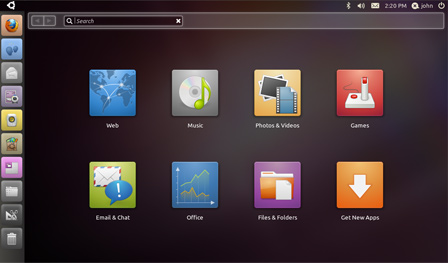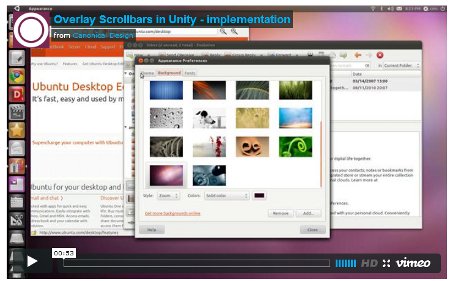Canonical tips Oneiric Ocelot release amid Ubuntu controversy
Mar 9, 2011 — by Eric Brown — from the LinuxDevices Archive — viewsCanonical has announced Ubuntu 11.10 (“Oneiric Ocelot”) featuring an alternative 2D UI and more Qt integration. Meanwhile, controversy's looming over the company's alleged anti-open source behavior in recent changes to Ubuntu, new tablet-focused features have been tipped, and the Linux distro has been ported to Motorola's Xoom tablet.
Canonical co-founder Mark Shuttleworth tipped an October follow-up to Ubuntu 11.04 ("Natty Narwhal"), which is due in late April. Ubuntu 11,10 ("Oneiric Ocelot") will formally incorporate a "2D experience to complement the OpenGL based Unity for those with the hardware to handle it," writes Shuttleworth. Here, he may be referring in part to the 2D ARM interface based on Enlightenment Foundation Libraries, which was announced a year ago.

Ubuntu Network Edition 10.10 with Unity UI
The Ubuntu co-founder also hinted at some changes to cloud support for Ubuntu — changes that are expected to be further detailed at the Ubuntu Developer Summit to be held in Budapest, Hungary, May 9-13.
"In the cloud, we'll have to tighten up and make some firm decisions about the platforms we can support for 12.04 LTS," he writes. "UDS in Budapest will be full of feisty debate on that front, I'm sure, but I'm equally sure we can reach a pragmatic consensus and start to focus our energies on delivering the platform for widespread cloud computing on free and flexible terms."
The latter comment suggests that the U.K.-based sponsor of the Ubuntu project will "narrow down the number of cloud services it supports out of the box," according to a story in The Inquirer.
The tightening is motivated by the approach of the long term support (LTS) release of Ubuntu 12.04, expected to follow Oneiric Ocelot in April 2012, says the story. Canonical is said to be typically conservative with its LTS releases, such as last April's Lucid Lynx. Lynx was followed by last October's Ubuntu 10.10 ("Maverick Meerkat").
With the Oneiric Ocelot title (let the misspellings begin), Shuttleworth says Ubuntu will "leave the oceanic theme behind." He adds, "Oneiric means 'dreamy,' and the combination with Ocelot reminds me of the way innovation happens: part daydream, part discipline."
Unity, Qt, Wayland efforts estrange Ubuntu lovers
Many in the Ubuntu community have seen Canonical's recent move as a betrayal of open source principles and a prelude to a corporate takeover of Ubuntu. They cite the company's lack of upstream contributions and controversial dealings with the GNOME Foundation over Banshee revenues,
This April's Ubuntu 11.04 is particularly controversial, as it will replace the Linux distribution's GNOME desktop environment as the default in favor of Canonical's multitouch-enabled Unity interface, thereby improving 3D graphics support and touchscreen support, according to the company. The release will also swap out OpenOffice.org for the new LibreOffice office suite fork, marking another, less controversial, break from the past.
In addition, the Narwhal will introduce Qt libraries as an alternative development environment to Gtk+, further extricating Ubuntu from its traditional embrace of all things GNOME. Coming atop Canonical's announcement that it was abandoning the X Window interface for Ubuntu's graphical stack in favor of Wayland, the Unity and Qt developments have met with considerable backlash.
The controversy over the introduction of the cross-platform Qt, which is greatly anticipated by many Ubuntu developers but seen as a betrayal by Gtk+ backers, was heightened when Nokia last month announced a shift away from Qt toward Microsoft's native Windows Phone 7 tools. (As a further indication it is moving away from Qt, Nokia announced this week it is farming out its Qt commercial licensing business to Digia.)
Banshee dust-up sparks reaction
Canonical received more backlash last month when it emerged that with Ubuntu 11.04, the GNOME Banshee media player will offer both the AmazonMP3 and Ubuntu One music stores turned on by default, with revenues from Ubuntu One going to Canonical. On Feb. 24, Canonical clarified the GNOME agreement, stating that 25 percent of the revenues from both services would be directed to the GNOME Foundation. This did not assuage some critics, however, according to Internetnews.com.
The growing friction between the open source community and Canonical was summed up in a Feb. 22 Datamation blog by Bruce Byfield called "Ubuntu: Where Did the Love Go?" Writes Byfield, "Instead of being the model corporate member of the community that it first appeared, today Canonical increasingly seems concerned with its own interests rather than those of FOSS as a whole."
Summarizing the eight-year history of Ubuntu and Canonical, Byfield noted that the Unity decision was just one more example of a "growing tendency to develop in-house" rather than collaborate with open source projects.
Byfield argues, somewhat less convincingly, that there do not appear to be many convincing technical arguments to go with Wayland, Unity, and other Canonical-promoted technologies over the established alternatives. He adds, "what concerns Ubuntu/Canonical is not the technical merits of the applications, but its ability to dominate the projects that dominate its software stack."
Byfield goes on to note that the Ubuntu project is not only ignoring many open source technologies, but also getting a reputation for contributing very little code upstream to the Linux kernel and GNOME projects compared to other open source projects. The shift away from open source collaboration could be a sign that, despite Ubuntu's fast growth, Canonical still remains unprofitable and sees a more hands-on, corporate approach as the only path to profitability, he adds.
Canonical's recent changes have received support from some quarters, including Savio Rodrigues, writing about the Byfield critique in InfoWorld. Rodrigues argues that Canonical's hands-on approach is necessary in the cut-throat technology world.
"When customers select product X, they do so based on the product's current merits and future road map," writes Rodgrigues. "Canonical seems to understand this — as does its real-world competition."
Put a fork in it?
Byfield's opinions generally received widespread support in the open source forums, according to Katherine Noyes, writing for LinuxInsider on Feb. 27. Responses have ranged from general agreement that Canonical is making Ubuntu too commercial to complaints about the rapid rate of change.
Noyes quotes one writer, "GameboyRMH" as noting, "Over the years people have been getting increasingly pissed off at the fact that Ubuntu is a bleeding-edge distro and updates tend to break stuff. Because of these issues a lot of people have been switching to Debian."
Writing about the lack of upstream contributions, meanwhile, Slashdot blogger "hairyfeet" was said to have opined, "Here you have the community having a fit about Canonical and them not sharing upstream, yet this simple fact is upstream doesn't want to go where Canonical is leading!"
Hairyfeet then goes on to suggest that Canonical should "fork the whole thing away from the 'community' and go off on their own," writes Noyes.
Ubuntu preps for tablets
Some of Canonical's recent Ubuntu changes, su ch as the Unity UI and Qt integration, are designed to make Ubuntu a more appealing platform for tablet developers.
ch as the Unity UI and Qt integration, are designed to make Ubuntu a more appealing platform for tablet developers.
Even without the coming tablet optimizations, there appear to be more consumer-oriented tablets running Ubuntu available than any other non-Android Linux distribution. These are mostly modestly appointed devices, such as Sharp's Netwalker PC-T1 (pictured above right.)
By comparison, only a few tablets run the Linux-based, Intel-backed MeeGo, which is aiming for a major tablet push with a formal tablet UI layer next month. Meanwhile, HP has so far announced only a single TouchPad tablet based on the Linux-derived WebOS.
If you consider Android to be Linux, despite its Java influence and other differences, all is right in the Linux tablet world. In fact, some analysts see Android tablets surpassing the Apple iPad by 2014.
If one sees Android as distinct from Linux, however, the picture is much bleaker, as summed up in this TechRepublic lament by Jack Wallen, entitled "Linux is losing the race to the tablet." Wallen seems fairly pessimistic about Linux taking hold, but offers some advice on what a Linux tablet platform needs to do to compete. Interestingly, he recommends Elive as the best potential Linux distribution to carry the tablet banner.

"Ayatana" overlay scrollbars for Ubuntu Unity
(Click to enlarge)
Essentially the new overlay scrollbars dispense with traditional scrollbars. The slim markers show the page's position, and a scroll thumb appears and disappears as the cursor moves within range, explains Max Eddy on Geekosystem.
"The scroll thumb also maintains the up/down button controls common on scroll bars," he writes. "This means more room for content on a page, but also greater continuity of controls across devices."
The story goes on to note that the GNOME project is thinking along similar lines for GNOME 3.0, but this time with the intention of removing the minimize/maximize buttons on the desktop environment. As described in an Afaik blog entry, the intention is to streamline the GNOME interface, which will still be available on Ubuntu 11.04 although not as the default, and remove unnecessary elements, especially on touch-based devices.
Ubuntu on the Xoom
Finally, for those who want Ubuntu on a high-end tablet now, Thomas Sohmers has posted instructions on how to load the distro on Motorola's Android 3.0-based, 10.1-inch Xoom tablet.
As Liliputing notes in a story on the port, the process doesn't replace Android, but installs Ubuntu alongside it, available via a VNC client. This is said to enable users to run Ubuntu inside a program window on the Xoom and flip between native Android and Ubuntu apps (see video below).
Thomas Sohmers' demo of Ubuntu on the Xoom on YouTube
(Click to play)
This article was originally published on LinuxDevices.com and has been donated to the open source community by QuinStreet Inc. Please visit LinuxToday.com for up-to-date news and articles about Linux and open source.